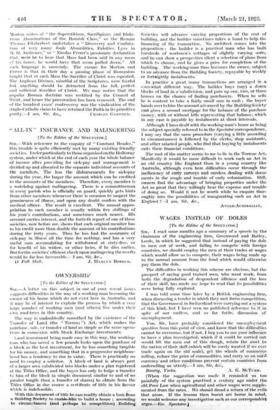WAGES INSTEAD OF DOLES
[To the Editor of the SPECTATOR.]
Sul,— I read some months ago a summary of a speech by the chairman of the engineering firm, Greenwood and Batley, Leeds, in which he suggested that-instead of paying the dole to men out of work, and failing to compete with foreign countries, we should employ the men at their trades at wages which would allow us to compete, their wages being made up to the normal amount from the fund which would otherwise pay them the dole.
The difficulties in working this scheme are obvious, but the prospect of saving good trained men, who want work, from both the degradation of despondent idleness and the loss of their shill, has made me hope to read that its possibilities were being fully explored.
I was told some time later by a British engineering firm; when discussing a tender in which they met Swiss competition, that the Government in Switzerland were carrying out a system of this kind, but I have seen no published reference to it' in spite of our endless, and so far futile, diseussion 'of
unemployment. . .
You, Sir, have probably considered the unemployment question from this point of view, and knoW that the difficulties cannot be overcome, but if not, I beg you to use your influence to have a plan investigated, which if it could be carried Out would. lift the men out of _this slough, retain the asset: to the nation of their skill (which will be sorely wanted if we ever trade again on the old scale), get , the wheels of commerce rolling, reduce the price of commodities, and carry us on until currency and other conditions prevent certain countries eoun" :triei: from underselling us utterly.—I am, Sir, Ac., [When the suggestion was made it reminded : us too painfully of the system practised a century ago under_ the .01(1.Poor Law when agricultural and other wages were supple- m‘ented from the rates. We should dread a return of the evils that arose. If the lessons then learnt are borne in mind, we would welcome any investigation such as our correspondent urges.—ED. Spectator.]






















































 Previous page
Previous page